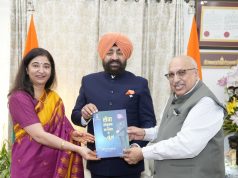By ARUN PRATAP SINGH
Garhwal Post Bureau
Dehradun, 29 Jul: The Supreme Court has issued a notice to the Uttarakhand Government asking it to respond over the appointment of a Receiver by the Badrinath Kedarnath Temple Committee (BKTC) for the famous Chandi Temple in Haridwar. It is pertinent to remind here that though the notice has been issued to the state government in this regard, the decision to appoint a receiver at Chandi Temple through Badri-Kedar Temple Committee (BKTC) had been recently given by Uttarakhand Hight Court through a verdict. The controversy had arisen due to the arrest and imprisonment of Mahant Rohit Giri on charges of molestation, and simmering disputes over succession entitlements involving his first wife, son, and another woman partner.
This latest development comes in the wake of the Nainital High Court’s order dated 25 June, which had mandated the appointment of a receiver, a decision that has been hotly contested and now finds itself under the scrutiny of the Supreme Court.
It may be recalled that the dispute in this regard arose with the arrest of Mahant Rohit Giri by Punjab Police on 14 May 2025, acting on a molestation complaint filed at Ludhiana, plunging the management and daily rituals of Maa Chandi Devi Temple into considerable uncertainty. Besides this case, the Mahant is also entangled in other personal issues, with a six-month-old son born to a woman with whom he maintains a live-in relationship and a 19-year-old son from his first marriage, and the resultant ongoing legal contention over succession. These circumstances have added further layers of complication to an already sensitive religious and administrative scenario.
It may be reminded here that Justice Rakesh Thapliyal of Nainital High Court, in response to the developing succession dispute and the perceived volatility in temple management, had delivered a verdict on 25 June directing appointment of a receiver, thus transferring control and oversight of the temple to the BKTC. This verdict, however, was promptly challenged in the Supreme Court by a sevayat, or serving priest, of the temple, with the plea that such intervention was neither warranted by any specific complaint nor supported by any evidence regarding alleged mismanagement. The petition pointedly recalled that as early as 2012, a committee led by the Haridwar District Magistrate and Senior Superintendent of Police had already been put in place for temple oversight, further questioning the necessity and timing of the recent order.
Responding to the Supreme Court’s notice, BKTC Chief Executive Officer Vijay Thapliyal shared that, as per the High Court’s directive under pending application No. 692/2025, the committee had formally assumed management of Maa Chandi Devi Mandir Parmarth Trust, Haridwar, from 2 July 2025. In pursuance of this, the committee deployed an administrative officer alongside six staff members to take charge of the temple’s affairs. These employees are currently overseeing day-to-day arrangements and are subject to regular inspections by both the officer-in-charge of Badrinath Temple and BKTC CEO Vijay Thapliyal.
In addition, BKTC has implemented a series of measures for the convenience and safety of devotees. A QR code facility has been introduced for donations, offering greater transparency, while the temple’s restrooms have been refurbished. Matting has been provided along the viewing path (darshan path), and new CCTV cameras have been installed to boost security. Additional improvements and upgrades are ongoing, aimed at sustenance and upliftment of pilgrims’ experiences.
The core challenge to the High Court’s June 25 order was submitted before the Supreme Court on behalf of Mahant Bhawani Nandan Giri, a senior sevayat of Maa Chandi Devi Temple, by Senior Advocate Siddharth Dave and Advocate Ashwini Dubey. During yesterday’s hearing, a bench comprising Justice Ahsanuddin Amanullah and Justice SVN Bhatt issued notice to the Uttarakhand government, giving it two weeks to file its reply.
The petition asserts that the century-old tradition of severance and priestly administration at the temple dates back to its reported establishment in the 8th century by Jagadguru Adi Shankaracharya, with members of the petitioner’s family consistently serving as sevayats. The petition further contests that the High Court transferred control of the temple to an external committee without any substantiated cause and ground, and that the disputed order was passed incidentally, during the hearing of an anticipatory bail application in a completely separate criminal matter.
Now that the government has been issued a notice by the Supreme Court’s notice it is required to submit its formal response by August, as questions over religious trust management, the sanctity of historical precedent, and implications of criminal proceedings continue to intertwine in the fate of Haridwar’s revered temple.








